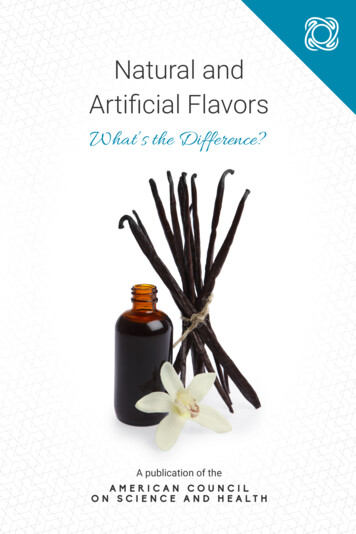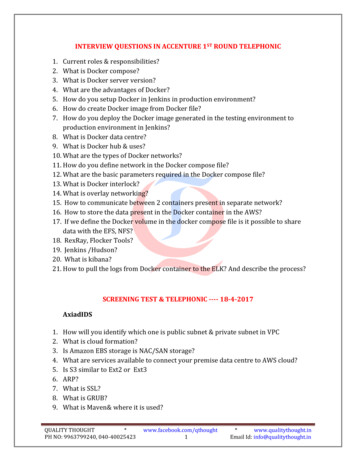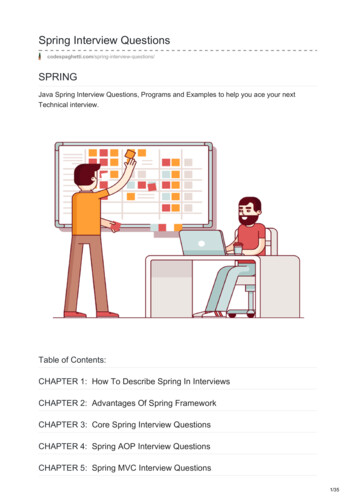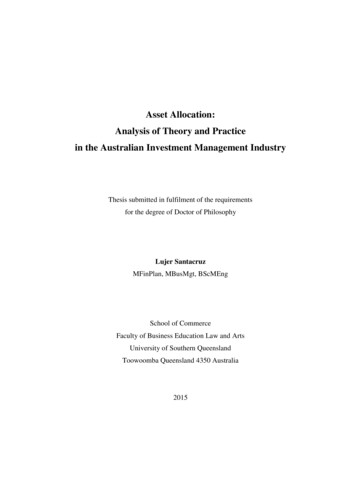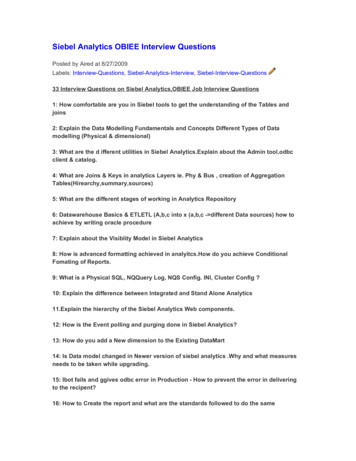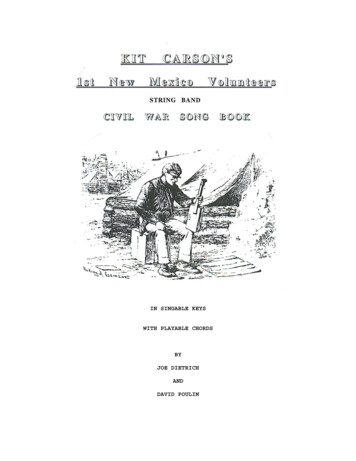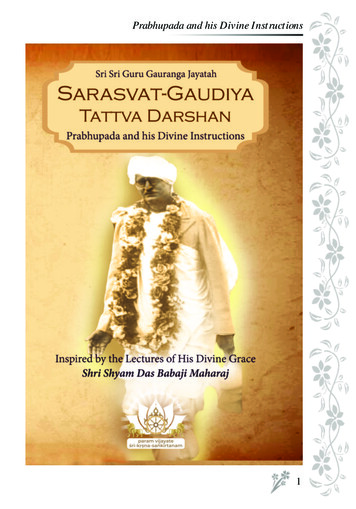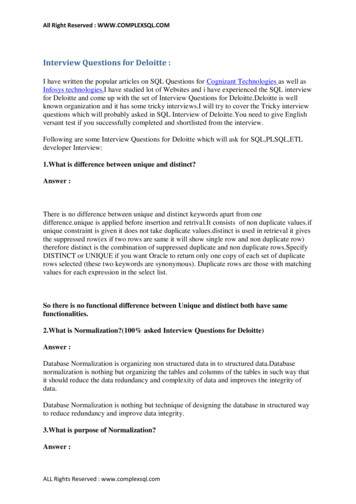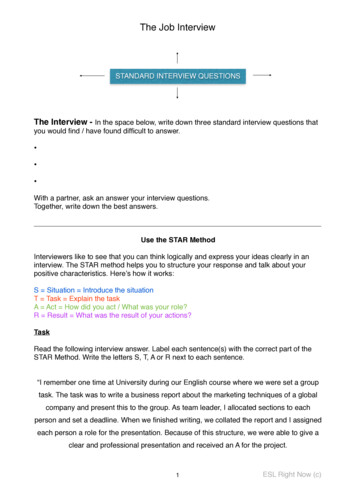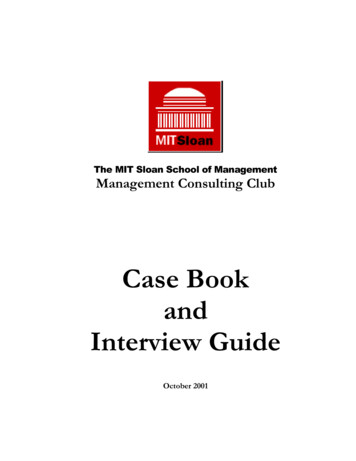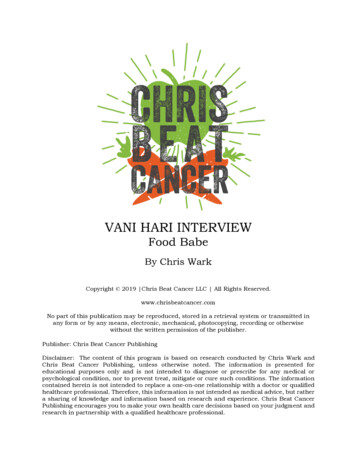
Transcription
VANI HARI INTERVIEWFood BabeBy Chris WarkCopyright 2019 Chris Beat Cancer LLC All Rights Reserved.www.chrisbeatcancer.comNo part of this publication may be reproduced, stored in a retrieval system or transmitted inany form or by any means, electronic, mechanical, photocopying, recording or otherwisewithout the written permission of the publisher.Publisher: Chris Beat Cancer PublishingDisclaimer: The content of this program is based on research conducted by Chris Wark andChris Beat Cancer Publishing, unless otherwise noted. The information is presented foreducational purposes only and is not intended to diagnose or prescribe for any medical orpsychological condition, nor to prevent treat, mitigate or cure such conditions. The informationcontained herein is not intended to replace a one-on-one relationship with a doctor or qualifiedhealthcare professional. Therefore, this information is not intended as medical advice, but rathera sharing of knowledge and information based on research and experience. Chris Beat CancerPublishing encourages you to make your own health care decisions based on your judgment andresearch in partnership with a qualified healthcare professional.
VANI HARI INTERVIEWFood BabeHey everybody, it's Chris. Got another awesome interview you foryou today with Vani Hari. Vani is also known as the Food Babe,and I've followed her for many years. Many of you probably knowwho she is. I think it's safe to say that Vani has probably madethe biggest impact on the food industry of anyone, in the last 10years. Maybe more. Based on her investigative research in exposing thebig food and food companies and restaurants for using some prettysketchy ingredients in the food that they serve you. So, she's done somereally awesome work and I just love what she does. She's written two bigbooks. "The Food Babe Way" was her first book, second book "FeedingYou Lies." I actually have that here. This one came out last year? 2018?Vani Hari:No! This year. 2019.Chris Wark: 2019! Okay. So, hey Vani.Vani Hari:Hey Chris. Thanks so much for having me. This is so awesome. I'm justthrilled to be on here with you because you're a crusader, like I am too.And you're not afraid to tell people the truth and what you've uncoveredabout the cancer industry. So, I love you for that. So, thank you.Chris Wark: Thank you. Yeah. And I didn't mention this in your intro, but you havecertainly been attacked a lot. I've been attacked a lot and you've beenattacked a lot. I would say more than me, for sure, just by major mediaoutlets. There's been such a big push back against your message and theinformation that you're putting out there and sharing with people. Andwe'll get to that. But again, mutual admiration society going on herebecause I think we both understand how tough it is to be passionateabout something, passionate about health and helping people andmaking a difference in the world. And we also understand that it's notvery fun when people are mean to you on the Internet. And so, yeah, Ireally just want to commend you for your resilience, and the fact thatyou stood your ground and didn't cave in and go hide in a holesomewhere, after all the attacks that you've endured. And I know it'smade you smarter and stronger and all that too. So, okay, I think that's agood enough intro. So, this is what I want to know. How did a mildmannered bank employee become Superhero Food Babe?Vani Hari:Mild mannered. I don't if I was always mild mannered.Chris Wark: Okay, that's a Superbad reference.Vani Hari:It's funny that you I was the kid with the name on the board. Right?
Chris Wark: Okay. Troublemaker.Vani Hari:I was supposed to be paying attention.Chris Wark: Me Too.Vani Hari:So, I never wanted to pay attention to the teacher. I didn't want to go toschool. I wanted to learn what I wanted to learn. But anyways, that wasme as a kid. But so, becoming an activist was completely by accident. Itwas not on purpose, by any means. And if you were to ask me 15 yearsago, would I be in the position that I am right now? I would tell you "no."10 years ago I would have said "no." Because I couldn't have envisionedthis life at all. Like, it's not something I put on a vision board and dreamtabout and wrote my daily dreams about. None of that.This all happened because of just my circumstance, and what happenedto me as a child and in my early adulthood. So, when I grew up, I couldeat whatever I wanted. No matter what it was, as long as it was cheapand it was food, my parents would buy it for me. Because they camefrom an Indian culture. They were two immigrants that came to theUnited States to live here. When my mom married my dad, they had anarranged marriage. My dad had been living here in the United States forjust a few years, going to school. And was summoned back by his motherto go back to India to meet a slew of different women, and then decidewhich one he wanted to marry. And then, they got married like a fewdays later. And he takes my mother back here on their honeymoon andliterally she never goes back to India after that.Chris Wark: That's so wild. It's just so wild.Vani Hari:It's so wild. But the first thing he said to her was like, "Hey, if we're goingto live like Americans, we're going to eat like Americans. And here's aMcDonald's hamburger." And she had never had beef before in her wholelife. I mean, because cow is sacred in India. So, they didn't eat any fastfood, processed food, anything like American industrialized foodwhatsoever. They were eating everything fresh from the garden. Sharinga cow between their neighbors to get fresh milk that's unpasteurized andraw. And they'd use it as a condiment. They'd make a little yogurt.They're milling their own flour. I mean, the whole shebang, right? All thevegetables that go into Indian cooking and all the spices that are verymedicinal in nature. She was used to that her whole life.So, coming here to America, it was a big cultural shift definitely, but alsofrom a food perspective as well. But they realize how easy it was andcheap to get food compared to how it was in India. And so they justadopted that philosophy. They're like, "America's so easy. It's so muchbetter." And so, my dad actually ended up getting every single one of myrelatives to move here, which is just insane. My entire family line, except
for like one or two random cousins and one aunt. So, it's crazy. They justlove America. And America is great.But what had happened during that time is there was this big push toindustrialize food because women started to realize that they had anopportunity to work. And they didn't have to be homemakers. And theprocessed food industry really fed into that philosophy and marketedtowards these women, that things could be fast, easy, and cheap. Andthat's why the drive-thru started to happen. That's why all of thesedifferent processed foods that make cooking, at the end of the day, easierstarted to develop. Microwave foods. Things like Hamburger Helper, BettyCrocker, Duncan Hines, all these brands that you know and lovedprobably as a kid, were all developed around that time where it justmade people's lives better and faster. And they could have more time.But what also happened during this time is the industrial age ofchemicals. And over the last 50 or so years, we've been a massiveexperiment on the food that we've been eating. There's been so manychemicals that have been developed for one sole purpose. And that is toimprove the bottom line of the food industry – to make processed foodlast longer on the shelves, to make it perform a certain way, to color it acertain way, to make it look a certain way, to make it addictive. Not reallyto improve our health. So, none of these chemicals are really there toimprove our health.So, as a result, we've just been so sick, as a nation. And I was sick as achild. I mean, I was on, at one point, 9 prescription drugs, under the ageof 20. That's just crazy. Right? That's crazy. And to think about the billthat my parents were paying for that, and the bill of like the insuranceand all the things that are involved. I mean, in a lot of my drugs, Iremember they weren't patented. So, they hadn't gone through the sevenyears. So, they, they weren't generic. They were very expensive.Chris Wark: And what were some of the conditions you had, at that time?Vani Hari:Well, I had asthma, very severe asthma, to the point where I could behospitalized if I didn't keep it under control. I had so much inflammationin my body that it was also Eczema showing up. A lot of stomach issues.Then later in my twenties, I started to experience a lot of hardcore stress.So, doctors put me on like Like I went to my doctor And these arestories that I really haven't told like in depth, but I think your audiencewill love this.Chris Wark: That's right. Chris Beat Cancer exclusive.Vani Hari:That's right. Yeah. So, I go to my primary care doctor, that I hadn't seenfor five or six years. And I went to her and I said, "Hey, I've got this boss.He is so reprehensible. To the point where I can't sleep. I can't eat. I'm sostressed out going to work. I don't know what to do about the situation.
He's verbally abusive. Like all of these things." I just went and said, "Thereason why I can't sleep and why I'm anxious is because of this. Thisboss." This doctor said, "Oh my goodness. Alright, we need to put you onCymbalta right away. We need to put you on Xanax right away. We needto give you Ambien. Those are the three things that I need to give you."Chris Wark: All at once?Vani Hari:All at once. No psychiatric evaluation. This is the first time I'm eventelling her about these issues. She could've just told me to quit my job.Right? That would have been the best advice I probably could've gotten.Just like a vote of confidence. Like, "You got this. You'll get another job.No worries." But instead, put me on these three major psychiatric drugsthat like are just intense and so hard to break free of, once you starttaking those.And that was one of the defining moments that led me to not only live Before that, I was on my health journey because I had appendicitis and Ilanded in the hospital. And I was overweight and very sick andoverworked. And that started the health journey. But when thathappened with my primary care doctor, that led me to that situation inmy life where I had to get out of that job and manage these symptomsand be put on these crazy prescription drugs and then get off of them.That is what really like developed my passion for natural healing andtruly organic without chemical living.Chris Wark: That was like the tipping point. And let me throw this in there too. So,my wife had a very similar story, not that extreme. But when we were incollege and we were dating, she went to her gynecologist and just kind ofoff-handedly mentioned that her cycles were unpleasant or whatever.And her gynecologist put her on Prozac. It was like, what? For what?They're putting you on a psychiatric drug because your menstrual cyclesaren't great? I mean, she got off of it after a few years, but it was reallytough to get off.Vani Hari:It's very tough.Chris Wark: Really tough. Yeah.Vani Hari:What was so scary is that for someone like me who had, I don't know, Ijust felt like I had a gift in terms of figuring out that this wasn't right.But there's so many people out there that don't know that that's notright for them, and there's a better way. And from being a kid, having allthese extreme issues and being on these prescription drugs. And then,going through that appendicitis episode, then going through this. I mean,it was just in and out of doctor's offices, in and out of the medicalsystem, on prescription drugs, not feeling great about myself. I just knewthat there was a different way intuitively. And I figured that out,thankfully, with the help of some amazing healthcare providers that
believed in western medicine, but also eastern medicine, and workedwith me to educate me on different things.And then, I had an amazing opportunity to work in Detroit, Michigan foralmost three years, to work in this corporate environment. And it wascool because I got to leave Charlotte – where I lived in North Carolina.Where we didn't have Whole Foods. We didn't have a lot of natural healthstores. To now this like Mecca I don't know if anyone knows this, butDetroit, like their farmer's market, everything is just like incredible. Andthey have all of these really cool little organic hotspots there.Chris Wark: I didn't know that. That's a surprise. I mean, Joel Kahn's there and he'sgot .Vani Hari:My friend Dr. Joel Kahn actually has a restaurant there. But anyways,one of my favorite restaurants in the world, In Season, is there. But I waslooking for these oases in this like desert environment of a corporateworld, where everybody is eating Subway. Because I was on this journey.And I found that there was just this whole community of healthy peoplewho are living vibrantly. And they had really said "no" to the traditionalmedical system and were looking at ways to heal their bodies naturally.And I was just learning from them.I would go to work, and I would work like 60 hours a week. And then atnight, I was alone. I was away from my husband. I didn't have a ton offriends. I had some work friends that would go with me to differentrestaurants. But I would hang out at all these organic places and meetall these people and learn all this stuff. And I just became really superpassionate about learning about what I was eating that was making mefeel this way and feel awful. And realizing that there was a different way.And I started to make so many shifts in my life that my wholeappearance started to change. And people around me started to ask like,"Hey, what are you doing? We want to know what's in this green drinkthat you're drinking. Why are you taking your cooler on the airplane, fullof food? What are all these things?"And I had an intervention between some friends and they said, "Bonnie,we want you to join Facebook." And I said to them, "I don't know if I wantto join Facebook." I was really into politics back then. And I said, "I maywant to run for office one day. I don't want all my personal stuff outthere." And they said, "Well, we want you to see your wedding picturesand everything else. And this is how we share information now." And thisis eight years ago. I didn't join Facebook until 2011. So, eight years ago.And I said, "Okay, I guess I'll join it."And then, I realized that, "Oh, well maybe I should start a blog and shareall this stuff on a blog. That way it's all categorized, and it's not just onthis random Facebook page." And so, I started it. I wanted to call itEatHealthyLiveForever.com. And my husband, who's the techie in the
family, said that was a stupid name. And he yelled out from the otherroom, "Hey, how about food babe?" And I said, "What? Food babe? I'mnot a food babe. Well, maybe we can like call it food babe, and it's wherewe teach people how to become food babes." And so, for the first year anda half of the blog, I never even had my photo on the front header. I hadthese three cartoon characters. And I just signed every blog post "FoodBabe" because I didn't want to use my real name. Because I was stillworking in this corporate environment working for C-level executives.But I found myself being at work, as I started writing and building thiscommunity online, and these people who thought just like I did Likethey thought things were healthy, that weren't. And when I'd share myexperience or share ways that I had been duped by the food industry,other people were like, "Hey, I can't believe it. I've been eating this. Ithought it was healthy too. I can't believe it. Thank you so much forsharing this information." And when I realized that I could changecompanies, that's when things started to take a big shift. And the firstcompany that I was able to change just by writing about it, was anorganic yogurt chain that was promoting the word "organic" all over theiryogurt, but then putting artificial food dyes and other additives, liketrans fats in their yogurt. And I investigated them, expose them on theblog, people shared that post so virally that the CEO apologized, wrote aletter to me, and then took down marketing. So, that was like my firstinclination that I could change the food industry.Chris Wark: Yeah, that's a pretty big win.Vani Hari:Yeah, it's huge. And I was like, "Well, if I can do this to this little yogurtchain, why not talk about the biggest food companies in the world?"Chris Wark: Why not Kraft?Vani Hari:Yeah. Why not Kraft and General Mills and Starbucks and Subway? Andso I did.Chris Wark: Can you run through some of those things? Like some of the highlights?Because I know there are long stories in each one probably, that youcould spend an hour talking about.Vani Hari:There are so many stories in each one. But some of the things that we'vebeen able to accomplish, which is just so cool, is we've been able to getKraft to remove artificial food dyes from mac and cheese and from a lot oftheir different products. General Mills has committed to removingartificial food dyes from their cereals. However, they go back and forth ontheir commitment. They said they were taking it out of Trix, but thenthey said they couldn't figure out how to take it out of Trix. I mean, comeon people.Chris Wark: "Don't you be messing with my Trix."
Vani Hari:I mean, it's ridiculous. The number one consumer of Trix is children.And if children are eating these foods that create hyperactivity, that's aproblem for me. And that's the risk that you take when you have artificialfood dyes. And so, that's why it was important for me to highlight theissue, so that parents could become aware that they could change theirchildren's behavior, their skin issues, their allergies by just removingartificial food dyes. So, yes, I wanted Kraft to change when I started thatcampaign, and General Mills and others. But the real reason I started thecampaign was to create awareness about the issue.And that goes for another issue. And this is a systematic issue, andthere's a whole chapter dedicated to this issue in "Feeding You Lies"about how our own US companies – the General Mills of the world, theKrafts, the PepsiCos, the Coca-Colas – they will reformulate theirproducts with safer, better ingredients overseas, but then serve us themore toxic chemicals here in the United States.Chris Wark: Yeah, it's like Mexican coke, right? They use real sugar in Mexico. Andcorn syrup in the US.Vani Hari:Yeah, it's just like that. Same with like Heinz ketchup. Heinz ketchup inEurope has no high fructose corn syrup. Here in the United States, highfructose corn syrup, and added flavors and other additives. In the UK,they use three basic ingredients to make french fries at McDonald's. Over19 here. One of them includes dimethylpolysiloxane. So, you probablydon't know what this chemical is Chris Wark: We all know what that is.Vani Hari:Dimethylpolysiloxane is a chemical that the FDA says can be preservedwith formaldehyde, which is a neurotoxin.Chris Wark: And cancer causer.Vani Hari:Right. And it is added as an anti-foaming agent to fried foods. It is not anecessary ingredient. What it does is it prevents that caking of likebubbling moisture on a fried food. It's an appearance thing after theytake it out on the fryer. And so, these chemicals are not necessary tomake these foods. But the food industry uses it to try to sell moreproduct or gain more profit. And they're being unethical because theyknow their products cause harm using these chemicals. And instead ofdoing the right thing, which is to formulate their products all the sameacross the board for all countries, they use the regulations of thatcountry to their advantage, which is capitalism. And because of our lackof regulation here in the United States, and the fact that our FDA isasleep at the wheel, we don't have strong regulations when it comes tofood. And they're allowed to get away with murder.
Chris Wark: And also, a part of it too is the fact that the lobbying system here isdifferent than other countries. And that the food industry can lobbycongress and influence the FDA in ways that other countries would belike, "Wow, I can't believe you let them do this."Vani Hari:That's right. So, in my book "Feeding You Lies," we actually go throughthe systematic issues that are wrong with the way that the food industryhas been able to manipulate data and how it gets to the public. They useso many secretive tactics that the blind eye can't see unless you start toreally investigate what you're reading out there. So, for example, they'lluse paid for spokespeople that look independent, that look reputable.They look like university professors that just want to be academic andteach the public. But they're really being paid by the chemical and foodindustry to be a mouthpiece for them. And so, when you see somethingonline that goes against your common sense .Like for example, recently there was just this huge article that came outand it was in every newspaper. "Coconut oil is bad for you and it's neverbeen good for you." And when you looked deep into who was sponsoringthe study, it was the American Heart Association that had two people onthis study that were being paid by the corn and canola industry. Andthey want you to continue using corn and canola oils that are veryinflammatory to the body. Coconut oil has gotten very popular becausepeople realize it's a healthier, more natural oil. It hasn't been dousedwith hexane through processing, like some of these other oils. Hexane isalso a neurotoxin.Chris Wark: And it's not from a genetically modified crop.Vani Hari:Yeah, that's right. And so, yeah, you have these situations where the foodindustry is manipulating data in the public and the media. And I takethe reader through all the different ways you can get duped by the foodindustry. So, the first book, "The Food Babe Way," was all aboutingredients. The second book is all about the tactics and manipulationsbehind the scenes. How they get you to believe a certain way or how theyeven get us to like eat fat free for so long, and then realize that they werereally just adding more sugar to these products and making us evenmore sick.Chris Wark: What are some of the most surprising, alarming, shocking, food additivediscoveries that you've made? Are there one or two that when youlearned about them, you were like, "I cannot believe this is in food!" Imean, I know there's a lot Vani Hari:I think the most ones are the ones that are just so stupid that I just can'teven believe the food industries are doing them. And I'll give you oneexample. Starbucks. For the longest time, Starbucks would not tell uswhat's in their drinks. So, any of the drinks that you would order atStarbucks, they would not give you the ingredient list. And that is a huge
red flag for me, when somebody won't give you the ingredient list.Because you're like, "What are in these coffee drinks that you want tohide," first of all. "And why do your competitors, like Dunkin' Donuts andothers, post all their ingredients online for people to see? And you're likea premium brand."And it wasn't until I convinced a barista to show me the differentpackages of ingredients that they were using to make the differentdrinks, that I was able to discover what was actually in like one of theirfamous drinks called the pumpkin spice latte. And what I discovered isthat they were adding caramel color level four, which is an ammoniabased caramel color, not something you get naturally. This is made in alaboratory. And then, when they tested it on rats, it causes cancer. Andthey were adding this to an already brown drink in an opaque cup! Youcan't even see it! And if you open it up, the top is the whipped cream thatyou see. You don't even see the color.So, it's just that kind of stuff that drives me crazy about the foodindustry. They put all these additives and colors and everything in thesefoods that are completely unnecessary. And even to the average Joe, itwouldn't even matter. Like the same reason why the Advil pill is blue. Itdoesn't need to be blue. You don't need to put blue dye in that Advil pill.And that's one of the reasons I started my company, Truvani. We create aline of supplements that we use the least necessary ingredients aspossible to make the supplement. A lot of the supplements use a lot ofinactive ingredients that are very actually active in your body. Tons ofadditives and coatings and sealants. And like soft gels have carrageenanin them, which also disrupts the gut.Chris Wark: Not to mention fillers.Vani Hari:Yeah, a bunch of different fillers, things that just aren't necessary. So, wefigured out a way to make supplements with the least amount ofingredients, including protein powders and collagen, that don't have anyof the fillers in it. And we leave it out. And yeah, maybe our product's notgoing to look as pretty, when you're trying to show a blue Advil pill. But Iknow that it's nourishing the body to the highest extent, and there's noreason to use those additional added industrial chemicals. So, that's oneexample of me just being floored at just the stupidity of an ingredient liston a product that just isn't necessary.Chris Wark: That is funny. Yeah. Because you're like, it's already brown. Brown. Howmuch more brown does it need to be? And how did Starbucks respond?Vani Hari:So, my campaign went viral after I released the ingredients in thepumpkin spice latte on my blog. It's the first time in history anyone knewwhat was actually in it. And it went so viral, I didn't even have to start apetition or anything. Every news station called me. It was all over thenews. I went to New York to be on all the morning shows. And they sent
a letter, maybe a month later, saying that they were going to change theformula and ingredients. So, yeah, they changed it and they took out thecaramel color.Chris Wark: Have they started disclosing ingredients since then?Vani Hari:Yes. And they posted all ingredients online, which was my whole point tothat campaign. Like there is no way I'm going to go have a pumpkin spicelatte. But for the people that are having them, I think it's important tohave it without caramel coloring, and all their drinks without caramelcoloring. So, they removed caramel coloring from, I think, every singleone of their drinks, which is great. But now you can go online andactually see what you're consuming. And that's been my biggest fight.For transparency. So that we know what we're actually eating anddrinking.One of the other campaigns that I had was to actually ask the twobiggest beer manufacturers in the world, Anheuser-Busch and MillerCoors, to release their ingredients. We had the same situation with thatis that. Like I could go in my fridge and I'd know every single thing that Iwas buying and eating and all the ingredients. But when I looked at likemy husband's Newcastle Beer, I had no idea what was in it. And knowingwhat I know about the food industry, I knew that they were like effingwith beer. They were totally effing with beer and wine and everythingelse. And a lot of people don't know that alcohol in this country isregulated by the Treasury Department, not the FDA.Chris Wark: Yeah, it makes total sense. Of course it is.Vani Hari:It's because of like archaic rules. So, they get away with just whateverthey want. It's really sad. So, there's no one requiring them to releaseingredients. But I think it's our right to know what we're consuming.Chris Wark: Let me just interject to say that the same applies to wine. Most peopleprobably haven't noticed, but one labels do not disclose. And you assumelike, "What's in there? Oh, it's just grapes." Right? "It's just some grapejuice. They fermented it, and now it's wine."Vani Hari:They're putting so many additives in food to create addiction and to turnon those brain receptors for you to remember a flavor and want to craveit. That I knew that they were putting those same ingredients in beer andwine, which alcohol already is addictive in its own sense. But thenadding those additional flavors and other components really upset me.And so, one of the things that I actually found through my campaign isthat New Castle beer that was in my fridge, they were adding caramelcoloring to it, to make that brown color. Not the natural fermentationprocess creating that. And so, they actually ended up removing thecaramel color because of that. And it was really cool. They sent me a
personal letter and said, "We know this is your husband's favorite beerand we removed it. We just want to let you know."Chris Wark: Well that was really nice. But did it change the color of the beer?Vani Hari:No, not much, I don't think. I mean, it doesn't look like it. Now myhusband has way better brands that he drinks. I hate beer. So, I don'tknow anything about beer. All I know is what's in beer. And the thingsthat I found out through that campaign really were alarming to me. Cornsyrup being added to beer, all sorts of things. But that was a really funcampaign because I had been working on that for almost a year, trying toget them to disclose what was in their beer, just to tell the public. Andthey wouldn't tell me. So, I was like, "Alright, we've got to start apetition."So, I pitted them against each other. "Miller Coors, Anheuser-Busch,post your ingredients." And of course, because of the competitionbetween the two brands, Anheuser-Busch was like, "We're going to do it."So, within 24 hours they contacted me, and they said, "Hey, we're goingto release the ingredients. We actually want you to see how our beer ismade. And we're going to invite you to St. Louis and we want to show youeverything and be really 100% transparent," which was really cool. Theywere very, very hospitable.Chris Wark: "Come to St. Louis. We want to get you real drunk so you'll be friendswith us and never say anythi
Vani Hari: I was supposed to be paying attention. Chris Wark: Me Too. Vani Hari: So, I never wanted to pay attention to the teacher. I didn't want to go to school. I wanted to learn what I wanted to learn. But anyways, that was me as a kid. But so, becoming an activist was com

